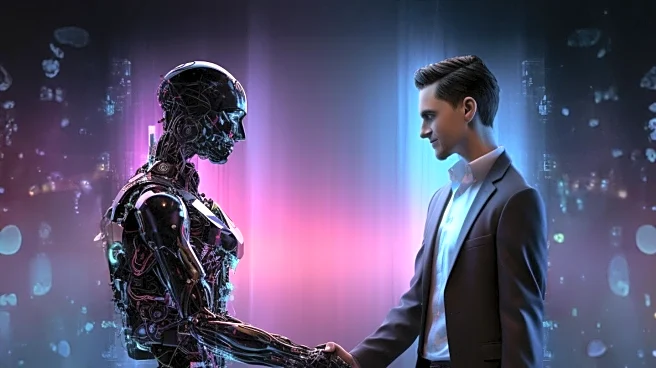What's Happening?
Teleoperated humanoid robots are increasingly being introduced into homes, controlled in real-time by human operators. This concept, known as teleoperation, is causing discomfort due to privacy concerns
and the uncanny valley effect. Companies like 1X and InteractionLabs are developing robots with human-like features, aiming to make them personable and friendly. Despite these efforts, the presence of a human operator controlling the robot raises concerns about surveillance and privacy. Critics argue that these robots could act as surveillance units, with operators observing through live feeds. However, proponents suggest that teleoperation could create new job opportunities, as remote robot operators become necessary. The development of fully autonomous robots is still in progress, with teleoperation serving as a temporary solution.
Why It's Important?
The introduction of teleoperated humanoid robots into homes has significant implications for privacy and employment. While these robots offer convenience, they also raise concerns about surveillance and data privacy, as operators can observe household activities. This development could lead to new job opportunities for remote robot operators, providing employment in a world increasingly dominated by AI. The slow progress towards full autonomy highlights the need for human oversight, ensuring that robots function safely and effectively. As companies continue to develop these technologies, the balance between convenience and privacy will be crucial in determining their acceptance in society.
What's Next?
As teleoperated humanoid robots become more common, companies will need to address privacy concerns and improve the technology to gain public trust. The development of fully autonomous robots is ongoing, but teleoperation will remain a key aspect of their operation for the foreseeable future. Companies may focus on creating robots that are more visually appealing and less intimidating to encourage adoption. Additionally, the potential for job creation in remote robot operation could lead to new training programs and employment opportunities. The evolution of these technologies will require careful consideration of ethical and privacy issues to ensure their successful integration into daily life.
Beyond the Headlines
The ethical implications of teleoperated humanoid robots extend beyond privacy concerns. The design and appearance of these robots play a crucial role in their acceptance, as they must appear friendly and non-threatening to be welcomed into homes. The uncanny valley effect, where robots appear almost human but not quite enough to be comforting, remains a challenge for developers. As these technologies advance, the cultural and societal impact of living alongside humanoid robots will become more apparent, potentially reshaping interactions and relationships within households.









